The Lost Book of Herbal Remedies by Dr․ Nicole Apelian and Claude Davis offers a comprehensive guide to natural healing with over 180 plants, empowering individuals to harness nature’s remedies for health and wellness․
Overview of The Lost Book of Herbal Remedies
The Lost Book of Herbal Remedies is a 304-page comprehensive guide to natural healing, featuring over 181 medicinal plants, lichens, and mushrooms native to North America; With detailed color images and descriptions, it serves as both a field guide and a reference manual․ Organized by ailments and plant profiles, the book offers practical instructions for creating herbal remedies, such as tinctures, salves, and infusions․ It blends ancient wisdom with modern research, making it accessible to herbalists and beginners alike, while emphasizing sustainable foraging and self-reliance in health care․
Importance of Herbal Remedies in Modern Times
Herbal remedies are gaining popularity as people seek natural alternatives to modern medicine, driven by a growing interest in holistic health and self-care․ With rising healthcare costs and concerns about pharmaceutical side effects, herbal solutions offer empowerment and accessibility․ They provide a proactive approach to wellness, aligning with the shift toward natural and sustainable living; The Lost Book of Herbal Remedies taps into this trend, offering time-tested, plant-based solutions that cater to diverse health needs, making it a valuable resource for modern wellness․
Key Features of The Lost Book of Herbal Remedies
The book features a quick reference guide, color pictures of 181 plants, and organization by ailments, making it a user-friendly resource for herbal healing․
Herbal Quick Reference Guide
The Herbal Quick Reference Guide in The Lost Book of Herbal Remedies allows users to quickly find remedies by specific ailments or plants․ Organized for easy navigation, it enables readers to identify natural solutions for common health issues efficiently․ With detailed descriptions and color images, the guide simplifies the process of locating the right plant or remedy․ This feature is particularly useful for those seeking fast, effective treatments without flipping through the entire book, making it a practical tool for both beginners and experienced herbalists․
Plant Identification and Color Pictures
The Lost Book of Herbal Remedies features high-quality color pictures of over 181 medicinal plants, lichens, and mushrooms, each accompanied by detailed identification instructions․ With 2-4 images per plant, users can easily recognize and distinguish species, even in the wild․ This visual guide is invaluable for foraging and field identification, ensuring accuracy and safety․ The vibrant images and clear descriptions make it accessible for everyone, from beginners to experienced herbalists, to confidently identify and utilize nature’s healing resources․
Organization by Ailments and Plants
The Lost Book of Herbal Remedies is uniquely organized into two comprehensive indexes: one by ailments and another by plants․ This dual approach allows users to quickly find remedies based on their specific health needs or identify plants they have access to․ The ailment index provides solutions for common and chronic conditions, while the plant index offers detailed uses for each species․ This intuitive structure ensures easy navigation, making the book a practical resource for natural health and wellness․

Authors and Their Expertise
Dr․ Nicole Apelian, an herbalist and biologist, and Claude Davis, a survivalist, combine their expertise to provide authentic, practical knowledge on herbal remedies and natural healing․
Dr․ Nicole Apelian: Herbalist and Biologist
Dr․ Nicole Apelian is a renowned herbalist, biologist, and survival skills instructor with over 28 years of experience․ She holds degrees in Biology and Ecology, and a Doctorate in Anthropology․ Nicole’s extensive research and hands-on experience with plants began during her work with the San Bushmen in the Kalahari Desert․ Her personal journey with MS led her to develop natural remedies, enabling her to thrive․ A contestant on the History Channel’s Alone, she survived 57 days in the wild using her plant knowledge․ Her expertise bridges traditional herbalism with modern science, making her a trusted authority in natural health․
Claude Davis: Wild West Expert and Survivalist
Claude Davis, a passionate Wild West expert and survivalist, brings a deep understanding of traditional remedies and wild edibles to The Lost Book of Herbal Remedies․ With a focus on preserving lost knowledge, Claude shares insights into plants used by earlier generations for survival and health․ His expertise complements Dr․ Nicole Apelian’s botanical knowledge, offering practical solutions for modern challenges․ Claude’s contributions highlight the importance of natural remedies in self-sufficiency, making the book an invaluable resource for those seeking independence and wellness․
Benefits of Using The Lost Book of Herbal Remedies
The book empowers individuals with natural health solutions, fostering a proactive approach to wellness․ It bridges traditional herbalism with modern holistic practices, offering a valuable resource for self-care and wellness․
Natural Health and Wellness Solutions
The Lost Book of Herbal Remedies provides a wealth of natural health solutions, focusing on plants and remedies to treat common ailments like pain, inflammation, and digestive issues․ It includes detailed instructions for creating herbal extracts, salves, and tinctures, making it a practical guide for holistic wellness․ The book emphasizes the healing properties of plants like Slippery Elm for gut health and Yarrow for wound care, offering readers a natural alternative to conventional medicine․ Its comprehensive approach empowers users to take charge of their health naturally․
Empowerment Through Self-Care
The Lost Book of Herbal Remedies empowers individuals to take control of their health through self-care․ By providing detailed instructions for creating herbal remedies, it enables readers to address ailments independently․ The book fosters confidence in natural healing, offering accessible solutions for wellness․ It educates on identifying and using plants effectively, making it a valuable resource for anyone seeking to prioritize their health without reliance on conventional medicine․ This knowledge promotes self-reliance and independence in healthcare, encouraging a proactive approach to wellness․
Holistic Approach to Medicine
The Lost Book of Herbal Remedies embraces a holistic approach to medicine, focusing on treating the whole person—mind, body, and spirit․ By emphasizing natural healing through plants, the book aligns with traditional practices that prioritize wellness over symptom relief․ It integrates ancient wisdom with modern research, offering a balanced perspective on health․ The comprehensive guide encourages readers to adopt a preventative mindset, addressing root causes rather than just symptoms, and promoting long-term well-being through nature-based solutions․
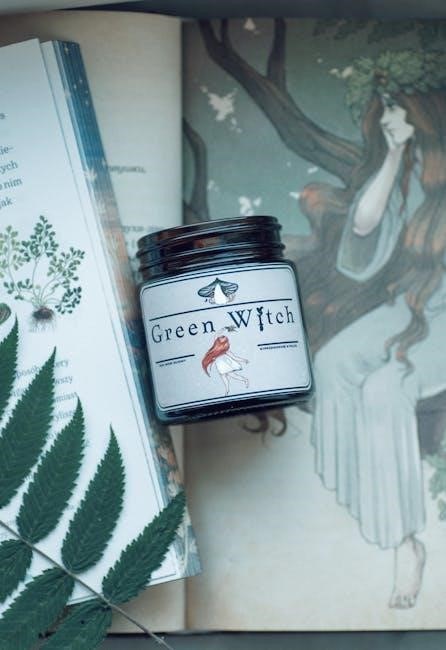
Popular Herbal Remedies in the Book
The Lost Book of Herbal Remedies highlights natural solutions like pain-relieving backyard plants, Native American ointments, and remedies for respiratory and digestive issues, empowering holistic health․
The Painkilling Plant Found in Backyards
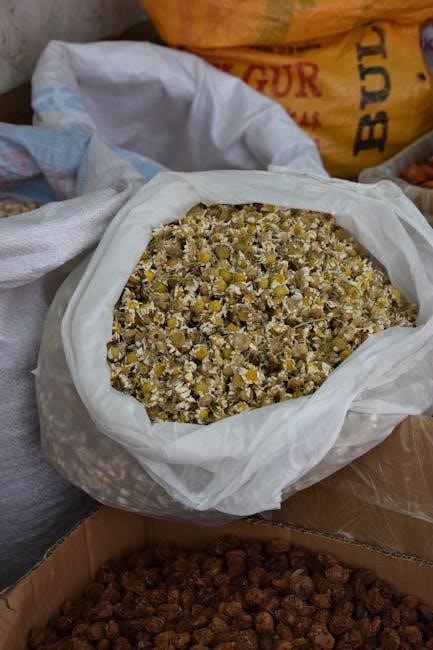
The Lost Book of Herbal Remedies reveals a common backyard plant containing lactucarium, which acts on the central nervous system to reduce pain․ This natural remedy, often overlooked, can be transformed into a potent extract for pain relief․ Its milky substance provides a safe, organic alternative to synthetic painkillers, making it a valuable resource for those seeking natural health solutions․ This plant’s versatility and accessibility make it a cornerstone of herbal medicine, empowering individuals to manage pain naturally․
Native American Ointment from the Tree of Peace
The Lost Book of Herbal Remedies highlights a traditional Native American ointment derived from the Tree of Peace․ This natural remedy, used by the Haudenosaunee people, effectively treats joint and muscle pain․ The ointment contains pycnogenol, a compound that reduces inflammation and enhances joint mobility․ Its historical significance and efficacy make it a cherished remedy, bridging ancient wisdom with modern holistic health practices․ This plant-based solution exemplifies the deep connection Native Americans had with nature and its healing properties․
Plants for Respiratory and Digestive Issues
The Lost Book of Herbal Remedies details plants like Boneset and Pipsissewa for respiratory and digestive health․ Boneset reduces fever and eases lung issues, while Pipsissewa tackles urinary inflammation․ Slippery Elm soothes digestive inflammation with its mucilage․ These plants, backed by traditional use, provide natural solutions for common ailments, making them invaluable for holistic wellness․ The book guides readers in harnessing these remedies effectively, ensuring safe and natural relief for respiratory and digestive discomforts․ This section underscores the book’s practical approach to health restoration․
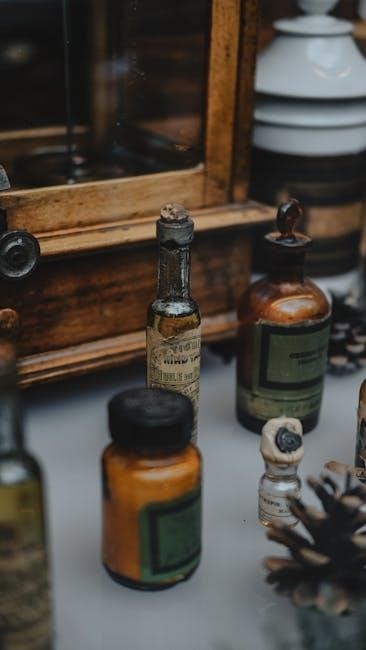
How to Use the Book
The book offers dual indexing: by plant or ailment, with detailed guides for identification and step-by-step remedy instructions, ensuring easy navigation and practical application of herbal knowledge․
Field Guide for Plant Identification
The Lost Book of Herbal Remedies serves as an excellent field guide, featuring high-quality color images and detailed descriptions for over 181 plants, lichens, and mushrooms․ Each plant is accompanied by 2-4 photos, ensuring easy recognition․ The guide provides clear instructions for identifying species, including details about leaves, stems, and flowers․ This section is invaluable for foraging, helping users distinguish between safe, edible plants and potentially harmful ones․ Whether you’re a novice or experienced forager, the guide empowers you to confidently identify and utilize nature’s remedies․
Index by Ailments for Easy Reference
The Lost Book of Herbal Remedies includes an index organized by ailments, allowing readers to quickly find natural solutions for specific health issues․ Whether you’re seeking remedies for pain relief, respiratory problems, or digestive concerns, the index streamlines the process․ This feature makes the book accessible to both beginners and experienced herbalists, enabling easy navigation and practical application of natural remedies․ It empowers users to address health challenges with confidence and efficiency, aligning with the book’s mission of promoting self-care and wellness through nature․
Step-by-Step Instructions for Remedies
The Lost Book of Herbal Remedies provides clear, step-by-step instructions for preparing herbal treatments, ensuring readers can easily follow along․ From brewing infusions to crafting salves, the guide offers practical methods for harnessing plant-based remedies․ Detailed recipes and techniques are included, such as making pain-relieving extracts or soothing ointments․ The instructions are designed to be accessible, empowering users to create effective remedies at home․ This ensures that even those new to herbalism can confidently prepare and use natural solutions for various health needs․

Safety and Precautions
The Lost Book of Herbal Remedies emphasizes proper dosage, understanding contraindications, and being aware of allergic reactions․ It advises consulting healthcare professionals before using remedies, especially for sensitive conditions․
Understanding Herbal Interactions
The Lost Book of Herbal Remedies highlights the importance of understanding how herbs interact with medications and other remedies․ It explains how certain plants can amplify or counteract the effects of medications, emphasizing the need for caution․ The book provides insights into potential allergic reactions and contraindications, ensuring readers use remedies safely․ By detailing how herbs influence the body, the guide empowers individuals to make informed decisions, avoiding harmful combinations and maximizing therapeutic benefits․ This knowledge is crucial for anyone exploring natural health solutions․
Proper Dosage and Usage Guidelines
The Lost Book of Herbal Remedies provides clear dosage and usage guidelines to ensure safe and effective application of herbal treatments․ It outlines how to measure herbs accurately and prepare remedies like teas, tinctures, or salves․ The book emphasizes factors like age, weight, and health conditions that influence dosing․ Specific instructions for plants like slippery elm or yarrow help users avoid overuse or underuse․ These guidelines empower readers to use natural remedies confidently, minimizing risks and maximizing benefits for optimal wellness․
Contraindications for Certain Remedies
The Lost Book of Herbal Remedies highlights important contraindications to ensure safe use of natural treatments․ It warns against using specific plants during pregnancy, for certain allergies, or in combination with medications․ For example, some herbs may worsen conditions like hypertension or interact with diabetes treatments․ The book advises consulting a healthcare provider before using remedies, especially for chronic illnesses or sensitive health conditions, to avoid adverse reactions and ensure safe, effective treatment․ This cautious approach promotes responsible use of herbal medicine․

Testimonials and Reviews
Readers praise The Lost Book of Herbal Remedies for its life-changing natural solutions․ Many share success stories, from pain relief to managing chronic conditions, empowering individuals to take charge of their health naturally․
What Readers Are Saying
Readers praise The Lost Book of Herbal Remedies for its life-changing impact, sharing stories of natural healing and empowerment․ Many highlight its practical solutions for chronic conditions, pain relief, and digestive issues․ Users commend the book’s clear instructions and vibrant plant images, making it accessible for both beginners and experienced herbalists․ The personal anecdotes, such as Nicole Apelian’s journey with MS, resonate deeply, inspiring trust in the remedies․ Overall, the book is celebrated for its holistic approach, fostering confidence in natural health and self-care․
Success Stories from Users
Users of The Lost Book of Herbal Remedies share inspiring success stories, highlighting its transformative impact on their health․ Many report effective relief from chronic pain, improved digestion, and reduced reliance on conventional medicine․ One reader praised the book for helping manage MS symptoms, while another credited it with resolving respiratory issues․ The clear instructions and vibrant plant images have empowered individuals to confidently use natural remedies․ These stories underscore the book’s practical value and its role in fostering health independence and wellness․
Criticisms and Controversies
Some critics question the accuracy of plant usage claims in The Lost Book of Herbal Remedies, particularly for regions like the Southeast U․S․ Concerns about misinformation and reliability have sparked debates, with skeptics urging caution․ While the book is praised for its wealth of knowledge, critics emphasize the need for verification of herbal uses, especially for sensitive medical conditions․ These discussions highlight the importance of consulting multiple sources and experts when exploring natural remedies․
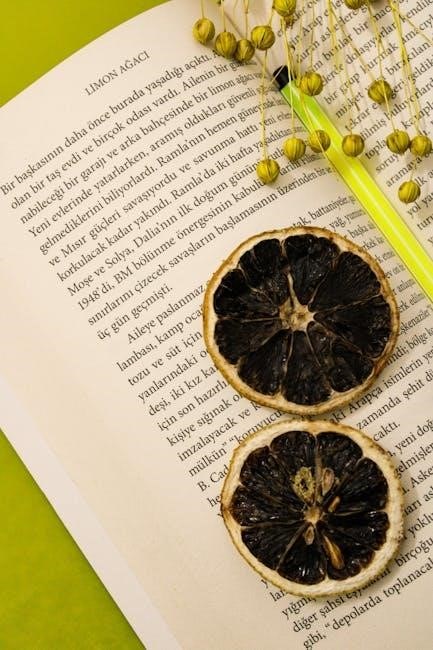
Historical and Cultural Significance
The Lost Book of Herbal Remedies preserves ancient wisdom, reviving traditional herbal practices and highlighting Native American contributions to natural healing, bridging past knowledge with modern applications․
Traditional Herbal Practices
The Lost Book of Herbal Remedies delves into the timeless wisdom of traditional herbal practices, rooted in ancient cultures and indigenous knowledge․ It highlights how Native American communities and early settlers utilized plants for healing, passing down remedies through generations․ The book emphasizes the importance of preserving these traditions, offering insights into historical uses of plants like Yarrow for wounds and the Tree of Peace ointment․ By bridging past and present, it ensures these natural healing methods remain accessible for modern wellness․
Native American Contributions
The Lost Book of Herbal Remedies highlights the profound contributions of Native American communities to herbal medicine․ Tribes like the Haudenosaunee revered plants like the Tree of Peace for joint pain, while others used Slippery Elm for digestive issues․ These traditional practices, passed through generations, form a cornerstone of the book․ By documenting remedies like Boneset for fever and Butterbur for allergies, the authors honor indigenous wisdom, ensuring these natural healing traditions thrive in modern times․
Reviving Lost Remedies
The Lost Book of Herbal Remedies brings back ancient healing practices, preserving forgotten knowledge of medicinal plants and their uses․ With detailed instructions for remedies like pain-relieving extracts and natural antihistamines, the book ensures these traditions are accessible to modern readers․ By documenting over 800 plants and their applications, it empowers individuals to reclaim their health independence, offering a bridge between past wisdom and contemporary wellness needs․ This revival of lost remedies fosters a deeper connection to nature and self-care․
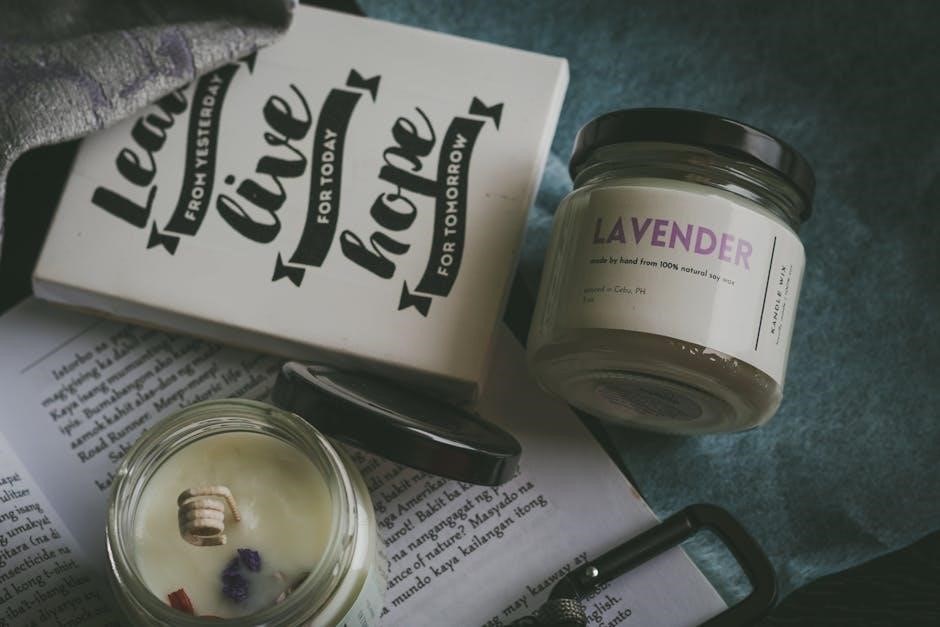
Impact on Wellness and Self-Care
The Lost Book of Herbal Remedies transforms wellness by offering natural, holistic solutions, empowering individuals to take control of their health through traditional plant-based practices and self-care routines․
Shifting Trends in Healthcare
As modern medicine evolves, there is a growing shift toward natural and holistic health solutions․ The Lost Book of Herbal Remedies aligns with this trend, offering a comprehensive guide to plant-based wellness․ By combining ancient wisdom with modern research, the book supports the movement toward self-reliant healthcare․ Its focus on natural remedies resonates with individuals seeking alternatives to synthetic treatments, making it a valuable resource in today’s health-conscious world․ This shift reflects a broader desire for empowerment and sustainability in personal health care․
Role in Modern Wellness Movements
The Lost Book of Herbal Remedies plays a significant role in modern wellness movements by bridging ancient herbal wisdom with contemporary health practices․ It empowers individuals to embrace natural healing, fostering health independence and sustainability․ The book’s practical guide to plant-based remedies aligns with the growing demand for holistic wellness solutions․ By reviving forgotten herbal practices, it contributes to a broader movement toward self-reliant and eco-conscious health care, making it a key resource for those seeking natural alternatives in today’s wellness-focused culture․
Empowering Individuals for Health Independence
The Lost Book of Herbal Remedies empowers individuals by providing the knowledge and tools to take charge of their health naturally․ It equips readers with the skills to identify, harvest, and use medicinal plants, fostering self-reliance and independence from modern medicine․ By offering practical solutions and detailed guides, the book enables people to address common ailments confidently, promoting a proactive approach to wellness and encouraging a shift toward natural, sustainable health care․
The Lost Book of Herbal Remedies is a vital resource for natural health, empowering readers with timeless wisdom to reclaim their health independence through nature’s remedies․
Final Thoughts on The Lost Book of Herbal Remedies
The Lost Book of Herbal Remedies stands as a transformative guide, blending ancient wisdom with modern insights to empower individuals in natural health․ With detailed profiles of 181 plants, it equips readers to identify, harvest, and use nature’s remedies effectively․ The books dual indexing system—by plant and ailment—ensures accessibility for all skill levels․ By reviving traditional herbal practices, Dr․ Nicole Apelian and Claude Davis offer a holistic approach to wellness, fostering self-reliance and health independence in an era seeking natural solutions․
Encouragement to Explore Natural Remedies
Natural remedies offer a powerful path to wellness, empowering individuals to take charge of their health․ With The Lost Book of Herbal Remedies, readers gain the tools to harness nature’s healing potential․ By exploring these timeless practices, one can discover safer, effective alternatives to modern medicine․ This book inspires a journey toward health independence, encouraging readers to embrace the wisdom of plants and reclaim their well-being․ Start your natural health journey today and experience the transformative power of herbal remedies․